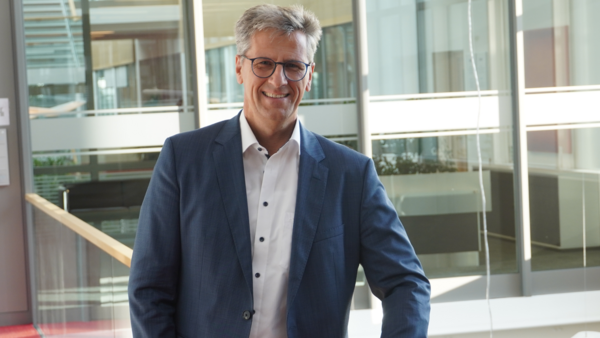Welcome Mr. Büker! What was your "path to inIT"? What did you do before?
About a year ago, I took over the professorship for the teaching area of computer science with a focus on knowledge-based systems at the Technische Hochschule Ostwestfalen-Lippe (TH OWL). Before that, I worked in the automotive industry for almost two decades. Most recently, I was in charge of global pre-development for autonomous driving at a large American corporation.
I originally studied computer science at the University of Paderborn, where I also completed my doctorate and habilitation. As a scientist, I became involved early on with image processing in robotics and automotive technology. Teaching never quite left me, so I continued to lecture regularly even during my time in industry.
My move from industry to academia was a conscious decision. Here at inIT, I see the ideal opportunity to apply my expertise in a targeted manner and get exciting projects off the ground.
Which topics do you cover? In which areas have you set your focus?
My main focus is in the area of software development with a particular focus on knowledge-based systems. In industry, I have also managed hardware projects and looked at the overall system. Roughly speaking, my focus topic is artificial intelligence in the context of autonomous intelligent systems.
Can you give us some insight into your new role as a board member at inIT and the associated responsibilities?
As a new board member at inIT, my goal is to drive activities in the area of intelligent systems. This also includes the area of autonomous driving. A first project is already in the starting blocks - NeMo.bil!
With a total volume of 30 million euros, the project has received a federal grant of 17 million euros from the German Federal Ministry of Economics and Climate Protection. Unlike conventional solutions, NeMo.bil relies on automated smaller vehicles (cabs) that combine to form a convoy and are pulled by a larger automated vehicle (pro). It aims to establish an innovative form of sustainable and on-demand passenger and freight transportation in rural areas. Light electric vehicles will enable individual and public mobility with unprecedented energy efficiency. In this project, I am leading the work package to develop the automated driving function of the Cabs.
Furthermore, we are working on the automation of traffic processes at the Innovation Airport Paderborn. In addition, there is another project in the application phase that deals with automation in rail transport. You will certainly learn more about the projects elsewhere - so stay tuned!
How do you like working at the institute?
I find the cooperation and the atmosphere in InIT as well as in the entire department extremely pleasant and positive. The physical proximity to my colleagues at the institute facilitates regular exchange. Whether at lunch together or in the hallway between door and door, there is always time and space for coordination.
I particularly appreciate the many points of contact with other colleagues who are involved in topics such as image processing, machine learning and cybersecruity. This interdisciplinarity opens up exciting opportunities for new topics and joint research projects.
In short: What are your plans, goals and visions here at inIT?
I would like to use my expertise in a targeted manner and establish various projects in the field of artificial intelligence. Particularly in the area of autonomous driving, I would like to drive innovative solutions and establish valuable collaborations with industry partners. We are researching projects that will shape the future of mobility and I aim for inIT to play a central role here.
Thank you for this informative interview and all the best for your start at inIT!


